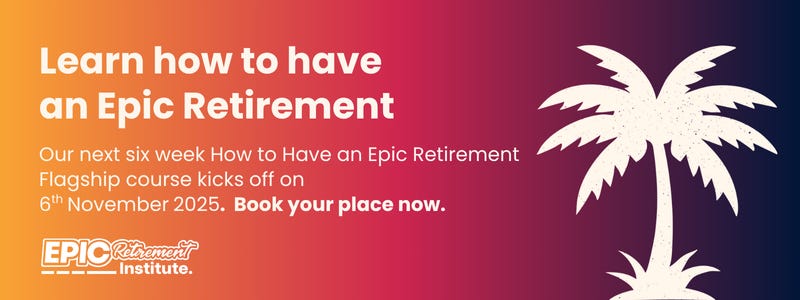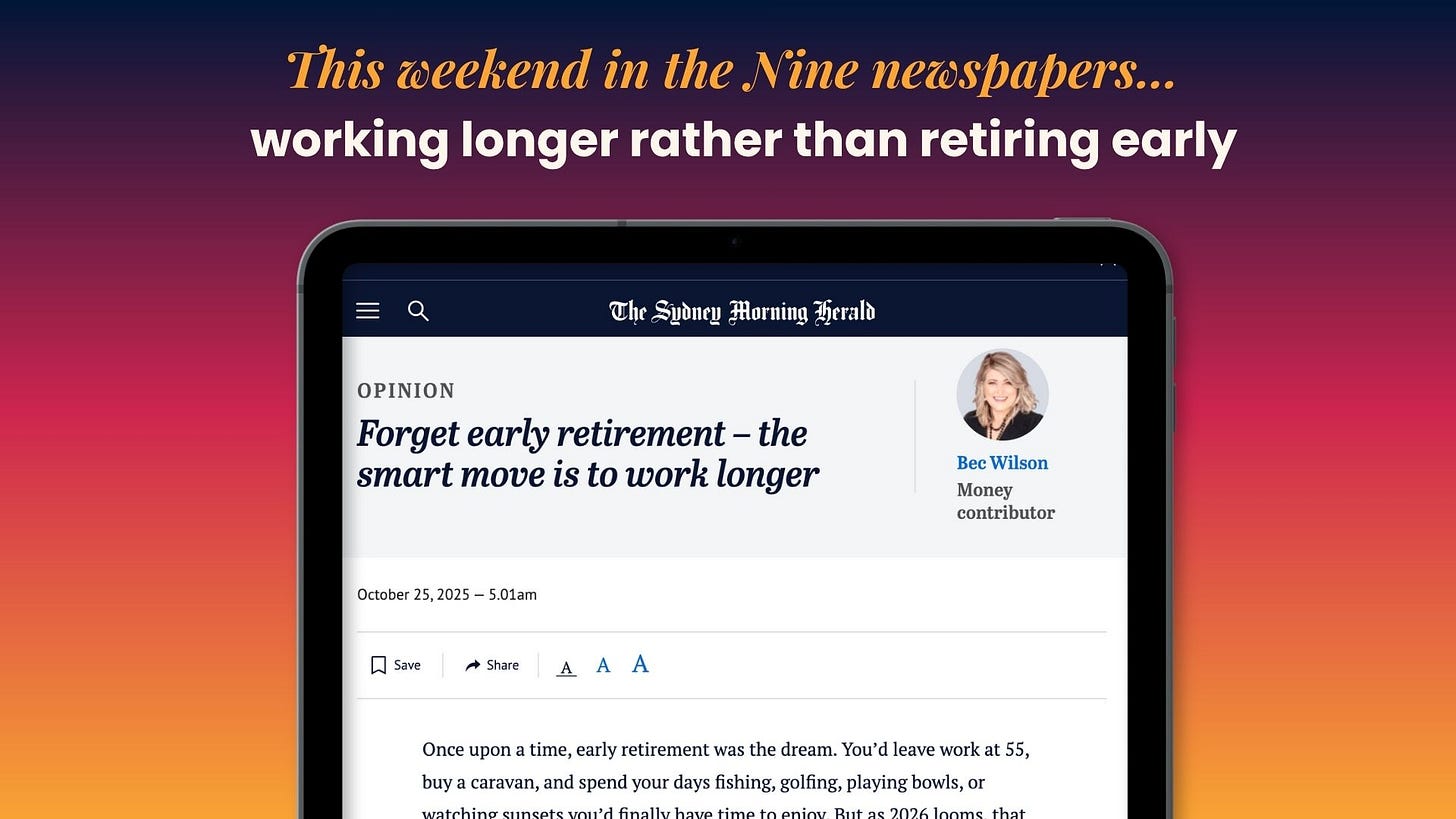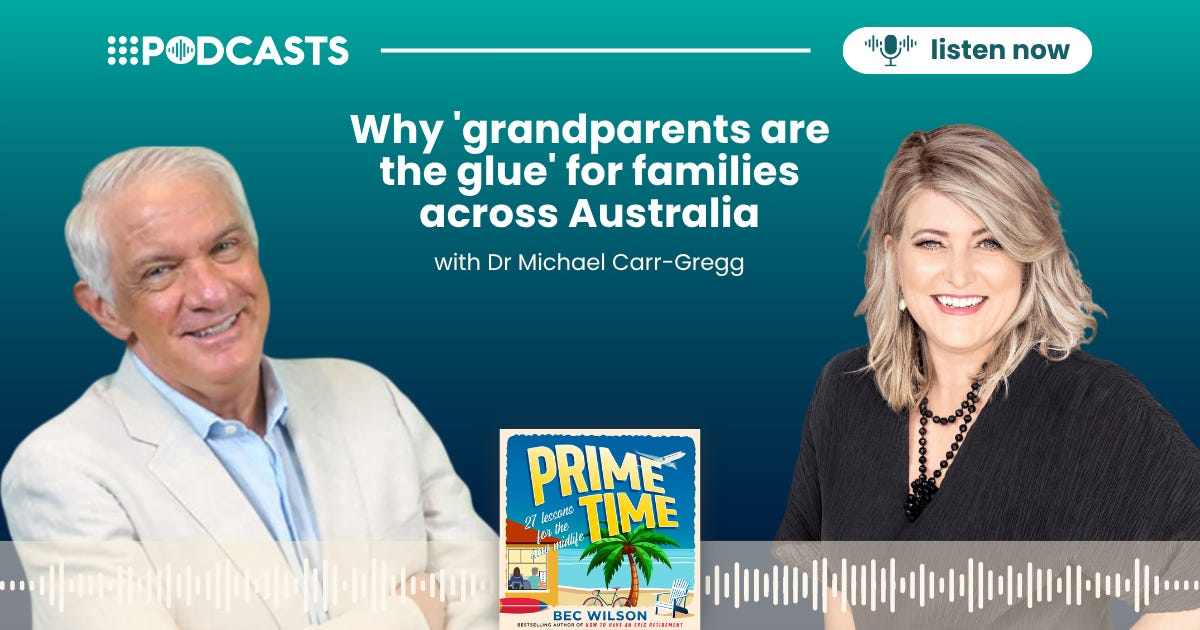What does your version of a comfortable retirement look like?
And in today's newspapers "Forget early retirement – the smart move is to work longer"
In this edition
Feature: What does your version of a comfortable retirement look like?
From Bec’s Desk: Ready for a quieter month - I am
SMH/TheAge: Forget early retirement – the smart move is to work longer
Prime Time: Why ‘grandparents are the glitter glue’ for families across Australia
But first - check out our new Epic Retirement Shop packed with retirement merch (and there’s more to come). It’s just launched - in time for Christmas gifting at shop.epicretirement.net.
What does your version of a comfortable retirement look like?
When people start planning for retirement, one of the first questions that comes up is, “How much will I need to live comfortably?” It’s a great question, but also one that can feel overwhelming, like there’s some secret formula you need an adviser to unlock.
The truth is, you don’t need a financial adviser to get started. Sure, advisers can help you use this number to refine and model how your superannuation can generate this amount; but the first step is simply getting clear on what comfortable looks like for you. This is personal. It’s about lifestyle, not spreadsheets.
Everyone’s version of a comfortable retirement is different. It depends on what you want your days to look like, how you like to spend money on discretionary items, and what makes you feel safe and happy. Maybe you see yourself travelling overseas at least once a year, or maybe you love the idea of being close to home and travelling in a caravan locally. You might want a smaller, low-maintenance home that doesn’t cost a lot to heat or cool, or you might dream of a home big enough for family visits. Some people value great food and eating out weekly and going to shows and events; others are happiest cooking at home. Even choices like buying organic or shopping the specials at the supermarket make a difference.
Your health plays a big part too. When you’re fit and energetic, you’ll probably spend more on activities and experiences. If you have health conditions to manage, comfort might mean keeping a little extra aside for healthcare services and allied health support.
So how do you actually figure out your version of comfort? Here’s a little exercise you might like to try:
Step 1: Picture your lifestyle
Close your eyes and imagine a regular week in your ideal retirement. What do your mornings look like? How do you spend your time? Who are you with? Are you travelling often, volunteering, doing part-time work, or enjoying slow days at home? Getting a clear mental picture is the first step to understanding what comfort really means to you.
Step 2: List your must-haves
Write down what you need to feel comfortable and secure. This might include housing costs, healthcare, groceries, utilities, insurance, and car expenses. Think about what it costs to keep your life ticking over today—then imagine what will stay the same and what might change.
Step 3: Add your “epic retirement spending”
Now think about the things that make life enjoyable. Big and small holidays, hobbies and pursuits, dinners out, golf, concerts, time with grandkids—whatever fills your days with meaning and joy. These are the items that turn a budget into a lifestyle plan.
Step 4: Check and project what’ll change over the years ahead
Your spending will shift when you stop full-time work. Maybe your mortgage will be gone, but your travel budget might go up - at least for the first ten years, if not more. Maybe you’ll spend less on work clothes and commuting, but more on experiences and proactive exercise or healthcare. List the things that will drop off and the things that will increase. Be aware of what you want from life as well as what you need.
Step 5: Add it up (roughly)
From here, you can ballpark what your lifestyle might cost per year. It doesn’t need to be exact—think in broad ranges. For example:
a modest lifestyle might need around $50,000 a year,
a comfortable one might sit around $70,000–$90,000,
and a more active or travel-heavy lifestyle might run higher.
Once you’ve got that range, you’ve done the hardest part—you’ve defined your own version of comfort. It’s good to step through this process practically, talk about it with your partner and really think about what comfortable looks like for you.
Because yes, there are plenty of benchmarks out there for what “comfortable” can look like. And you can absolutely use them later—to check your approach, see if you’ve missed anything, or just sense-check where you’re at.
But I’ll bet when you look closely, you don’t want their standard version of retirement. You want yours.
So start here. Define what comfort means for you—your lifestyle, your priorities, your joy—and then build everything else around that picture. That’s where the real clarity (and confidence) comes from.
It’s late Friday afternoon and I’m finally back on the ground in Brisbane after another big week on the road — this time through Melbourne. I started out at Lifestyle Communities in Clyde for a keynote, then headed into the city to speak at the Industry Fund Services Annual Conference for financial advisers working across the superannuation sector.
Now, I’m very ready for a couple of weeks closer to home, tucked away in the studio recording the two audiobooks that need to go out in the months ahead.
The recording for the NEW Australian and New Zealand edition of How to Have an Epic Retirement kicks off Monday. I’ll be in a dedicated studio for at least seven days to put that one to bed, and then I’ll start on the UK edition. It’s a great way to reconnect with the material — though I’m sure I’ll be completely over the sound of my own voice after three weeks in a booth! I’ve got a trusty jar of Manuka honey to maintain my voice.
Our audiobook has been one of the most loved formats over the past three years, so it’s exciting to be updating it with all the juicy new information and fresh stories.
Despite all the travel, my wonderful team and I have been busy on the course front too.
We’ve kicked off the Exclusive HESTA Epic Retirement Course, now up to week 2, and we’ve filmed and edited a brand new and improved version of our own open-to-everyone Epic Retirement Flagship Course, which launches on 6 November.
This is the first new program we’ve released based on the updated edition of the book — and it looks absolutely gorgeous. There’s also a completely refreshed workbook, both currently on their way back from the printers next week.
On that note — our How to Have an Epic Retirement Flagship Course is still available at the 25% early bird rate. We’ve added a few extra places at the lower price, but not for much longer. So if you’ve been thinking about joining, now’s the time! You can register your place here and download the brochure to learn more about what’s inside.
And lastly, we’ve just launched a groovy range of merchandise - some fun t-shirts you can get in and order for Christmas. Pop over to shop.epicretirement.net to order yours! They make great gifts for retiring colleagues too.
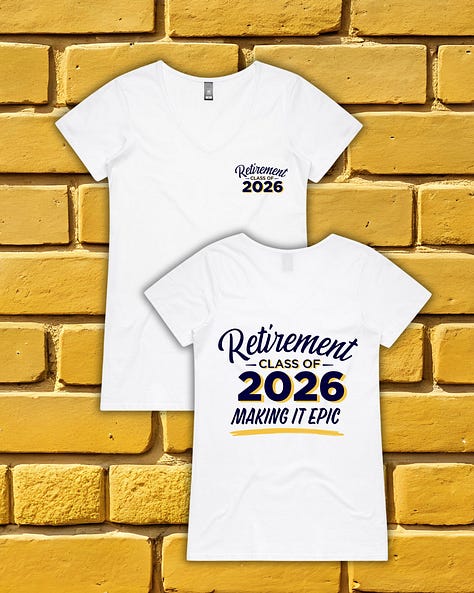

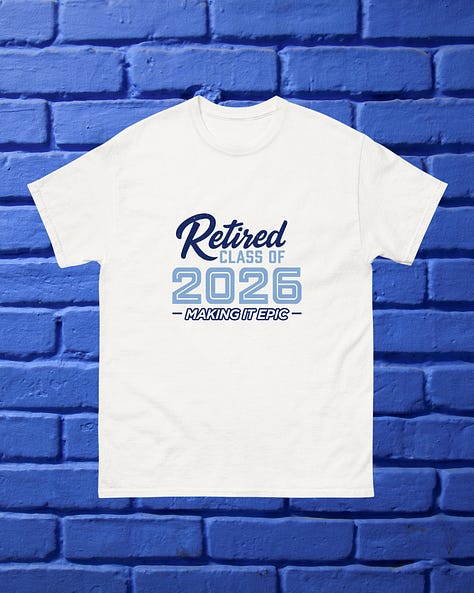


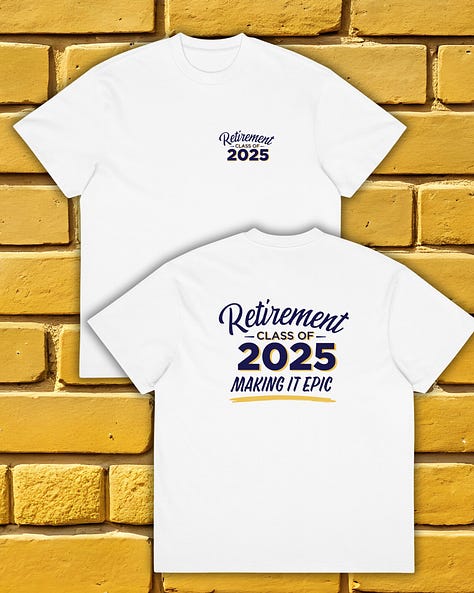


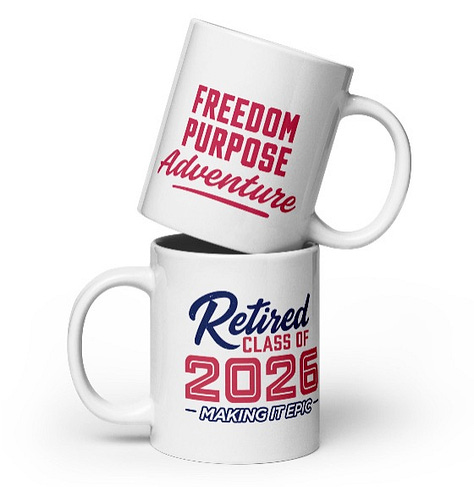
Have a lovely weekend. I’m going to be trying to stay off the devices and catch up on some sleep post-unresolved-jetlag - wish me luck!
Many thanks! Bec Wilson
Author, podcast host, columnist, retirement educator, and guest speaker
Extract of of my weekly column in The Age, The Sydney Morning Herald, Brisbane Times, WA Today on Sunday 26th October 2025.
Forget early retirement – the smart move is to work longer
Once upon a time, early retirement was the dream. You’d leave work at 55, buy a caravan, and spend your days fishing, golfing, playing bowls, or watching sunsets you’d finally have time to enjoy. But as 2026 looms, that fantasy is starting to look … well, a bit outdated.
The smart money’s on working later and not because we have to, but because it makes everything about retirement work better. Australians are living longer, healthier and, crucially, more flexible lives.
The average 65-year-old today can expect another 20-plus years of good health. That means retirement isn’t a finish line any more, it’s a long, evolving stage of life that can last three beautiful decades.
The data backs it up. According to KPMG’s analysis of the ABS Labour Force Survey just released, the expected retirement age for Australian men has climbed to 67, and for women to 65.3 both now the highest in history.
Read on — this article continues in The Age, The Sydney Morning Herald,Brisbane Times and WA Today. It is free to read - you may have to sign up, but there’s no paywall on my articles.
This week on Prime Time, we’re celebrating Grandparents Day by exploring the evolving — and increasingly demanding — role of modern grandparents. It’s one of my favourite shows in the podcast yet.
I’m joined by one of Australia’s most trusted psychologists, Dr Michael Carr-Gregg. He’s a leading expert on families, mental health and modern parenting — and he says that grandparents are the “glitter glue” holding many Australian families together.
Whether you’re new to grandparenting or deep in the trenches, this conversation explores how the role has evolved, how to build strong relationships with your grandkids from the beginning, and how to navigate the emotional complexity that can come with it.
Dr Carr-Gregg’s most recent book, Grandparents: A Practical Guide to Navigating Grandparenting Today, is packed with invaluable insights. On the show, he shares the big lessons every modern grandparent needs to know.
This episode is packed with practical tips and fresh perspectives on making grandparenting a joyful, impactful, and fulfilling part of your Prime Time years. Don’t miss it!
LISTEN TO THIS EPISODE OF THE PODCAST HERE:





